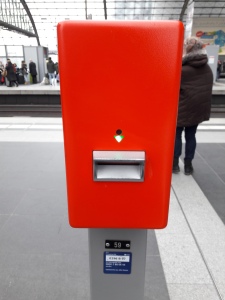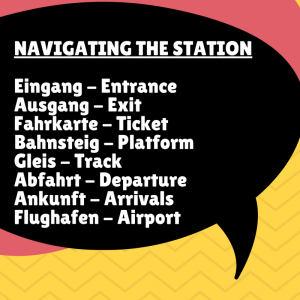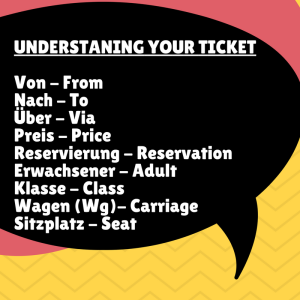It’s no secret that Germany is one of my favourite countries to visit. Gorgeous cities & towns, helpful & friendly locals, good value for money, and a wealth of cultural pursuits draw me back again and again. In my Munich post, I extol the virtues of the German automobile industry and the desire to travel the country using the various German car brands. But I also enjoy travelling Germany by train and this post will help you navigate its railroads.

The essential two words for train travel in Germany are Deutsche and Bahn which translate as German and train. Deutsche Bahn (DB) is also the state company which manages the railway network, runs the majority of inter-city trains plus handles the ticketing.
The first step in successfully travelling Germany by train is familiarisation with the Deutsche Bahn website which I will explain later. DB is also available in app format and a mobile phone in Germany is called a Handy. DB’s online presence is so good it even gives train information for journeys within other European countries. Going from Milan (Milano) to Rome (Roma) in Italy. No problem, go to the DB website for the timetable!
The trains on many regional routes in Germany are operated by various private companies but tickets can still be purchased through DB. For example, the Munich to Tegernsee route is operated by Bayerische Oberlandbahn GmbH (or BOB for short) but all the train information and ticket purchasing is still available through DB.
What does Hbf mean in English: Hbf is the short for Hauptbahnhof which is the German word for main railway station or central station. Haupt is the German word for top, main, head honcho etc.

USING THE DEUTSCHE BAHN WEBSITE
Let’s do a search for trains serving the Munich to Nuremberg route. Under the timetable and booking tab on the home page input Munich and Nuremberg as your start and finish points. Munich will appear as its German form München. Along with date and time you can also choose options related to train speed, type of traveller and class of carriage. A BahnCard is a subscription service and not suited for one-off trips to Germany so let’s ignore it for now.
The results page now shows Nürnberg which is the German form of Nuremburg. Along with train times and journey duration the information shows the number of train changes required (in this case, none), the type of trains available (products) and two prices: Sparpreis (Savings Fare) & Flexpreis (Flexible Fare). Tickets can be booked on both the website and app but the website ticket will need to be printed in paper format.
Sparpreis v Flexpreis: The difference between a Sparpreis ticket and a Flexpreis ticket is easy. A Flexpreis ticket entitles you to travel from A to B at any time within the validity period of the ticket. Spontaneous stopovers along the route are also possible within this period.
A Sparpreis ticket restricts you to a specific train on a specific date with no stopover. Savings of up to 50% can be made by choosing Sparpreis tickets so it pays handsomely to be organised and decisive. A Sparpreis ticket will allow you to reserve a seat for an extra fee which is recommended for travel during busy periods and especially on long-distance trains.
If travelling to/from another country it may be cheaper to book the ticket through the other country’s rail network. For example, the Berlin to Prague route is operated by Czech Railways who sell tickets at a much cheaper price than Deutsche Bahn.
VALIDATING TRAIN TICKETS
Train tickets purchased online do not have to be validated prior to boarding as they contain a QR code which the ticket inspector scans. However, you may be asked for photo ID.
All other tickets will need to be validated (stamped) prior to boarding the train. Validation stamping machines are usually located beside tickets machines or on platforms and are usually red or yellow in colour. As long as a machine says Bitte hier entwerten/Please validate here shove the ticket into the slot until you hear a click. Failure to validate a ticket will result in a fine.

TYPES OF TRAINS IN GERMANY
Returning to our Munich – Nuremberg search we see two types of products (i.e. train types): ICE and RE. ICE is the Inter-City Express and is Germany’s high-speed train fleet. The RE is the Regional Express which connects cities to each other within regions. In our example, both Munich and Nuremberg are in the state of Bavaria. The following is a list of train types starting with the fastest:
ICE: Inter-City Express (High speed service connecting cities)
IC: InterCity (Connects cities at a slower pace than ICE)
EC: EuroCity (Connects international cities)
EN: EuroNight (International trains with sleeping cars)
RE: Regional Express (Connects cities within regions)
RB: Regional Bahn (Connects towns within regions)
S-Bahn: Suburban rail
U-Bahn: Underground rail in cities

SAFETY
Germany is one of the safest, law-abiding countries I’ve visited. It took several years of travel to the country to actually see a police officer for the first time! With the exception of one experience on the Berlin to Prague train (drunk passengers, luggage taken), train travel in Germany is safe and civilised.
GERMANY BY TRAIN: USEFUL VOCABULARY
Don’t know your eingang from your ausgang? Thankfully, German and English come from a similar linguistic family making German an easy language to read and pronounce for English speakers.


Germany has a population of 82 million people, the largest in Western Europe. How all get from A to B without stress or fuss is an extraordinary sight and a template for the rest of the world. Germany is transport heaven. And travelling Germany by train is just part of that great experience, and an environmentally-friendly option to boot. So go enjoy it!
Enjoyed this? Then check out my Germany Travel Tips post for further advice on this great country.
Agree, we’ve driven bussed and trained in Germany. The Autobahn is scary stuff!!
LikeLiked by 1 person
Bahn.de is one of my favorite websites on the whole internet! You can also use it to search most trains throughout Europe.
LikeLiked by 2 people